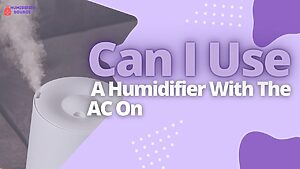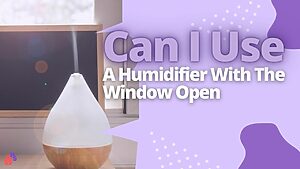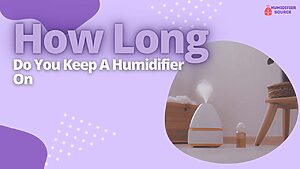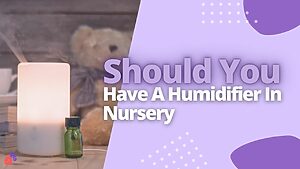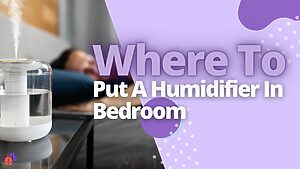You are not alone if you have ever wondered whether you can use drinking water in a humidifier.
Many people are still determining what type of water to use in their humidifiers and whether or not using drinking water is safe.
In this blog post, we will answer the question of whether or not you can use drinking water in a humidifier.
Key Takeaway’s
- Humidifiers can add moisture to the air, which can help to relieve congestion and coughing.
- Drinking water is safe to use in a humidifier as long as you clean the device regularly.
- Using distilled or filtered water in your humidifier can help to prevent mineral build-up.
- Consider using a demineralization cartridge in your humidifier if you have hard water.
- Be sure to follow the manufacturer’s instructions when using your humidifier.

Here’s The Answer To Can You Use Drinking Water In A Humidifier
Yes, you can use drinking water in a humidifier. It is often recommended because it is less likely to contain minerals that can build up in the humidifier and lead to problems.
Be sure to clean your humidifier regularly according to the manufacturer’s instructions. This will help prevent bacteria from growing in the unit. You may need to use distilled water instead of tap water to avoid mineral build-up if you have hard water.
Using drinking water in your humidifier is generally safe and can be an excellent way to improve indoor air quality.
Follow the manufacturer’s instructions for cleaning and maintenance to keep your humidifier running smoothly.
Using Drinking Water In A Humidifier Is Not Recommended

There are a few reasons why you should avoid using drinking water in your humidifier. You need to find out what kind of minerals in the water could harm your health if they build up and clog your humidifier.
It’s essential to clean your humidifier regularly so that mold and mildew don’t grow inside it, especially if you have respiratory conditions or a weakened immune system, as these contaminants can worsen those ailments.
This Can Cause Health Problems For People With Respiratory Conditions Or Weakened Immune Systems
While drinking water from a humidifier won’t poison you or make you sick, laboratory studies have shown that higher levels of microbes like mold can grow in tanks where the water has been sitting for too long.
Suppose this happens, and someone with a weakened immune system drinks from it. In that case, they could get very sick and develop pneumonia or other infections caused by breathing in these pathogens.
It’s also important to note that breathing in any amount of bacteria or mold spores can cause respiratory issues for someone without an immune system issue—and as anyone who has ever had a cold knows all too well, these types of illnesses aren’t fun at all.
It Is Important To Clean Your Humidifier Regularly To Prevent The Growth Of Mold And Mildew
It is essential to clean your humidifier regularly. Mould and mildew can grow in humidifiers, and these fungi can cause health problems when left unchecked.
They are toxic, dangerous, and can cause respiratory problems if inhaled. This is why you must clean your humidifier with a vinegar solution once a week (depending on how often you use it).
The vinegar will kill any mold growing inside of it without leaving behind any toxic chemicals that could harm anyone using the device later on down the road.
You Should Use Distilled Or Filtered Water In Your Humidifier To Avoid These Problems
Your humidifier will eventually produce less mist and begin to smell because the minerals in the water tend to accumulate on the tank and the wick.
When thinking about which kind of water to use, distilled is best if you want to avoid mineral build-up; filtered is better if you want to prevent bacteria or mold growth.
But either way, stick with something free of particulates like chlorine and rust particles that will clog up your system in no time.
If You Do Use Drinking Water, Be Sure To Change It Every Day
If you’ve decided to use drinking water in your humidifier, then be sure to change it daily. It’s also essential that you clean your humidifier regularly.
If you don’t clean the humidifier, it can become a breeding ground for bacteria and mold build-up.
There are several methods of cleaning a humidifier that includes vinegar, bleach, baking soda, and hydrogen peroxide, as well as regular use of white vinegar or baking soda solution at least once a week.
How Does A Humidifier Work?
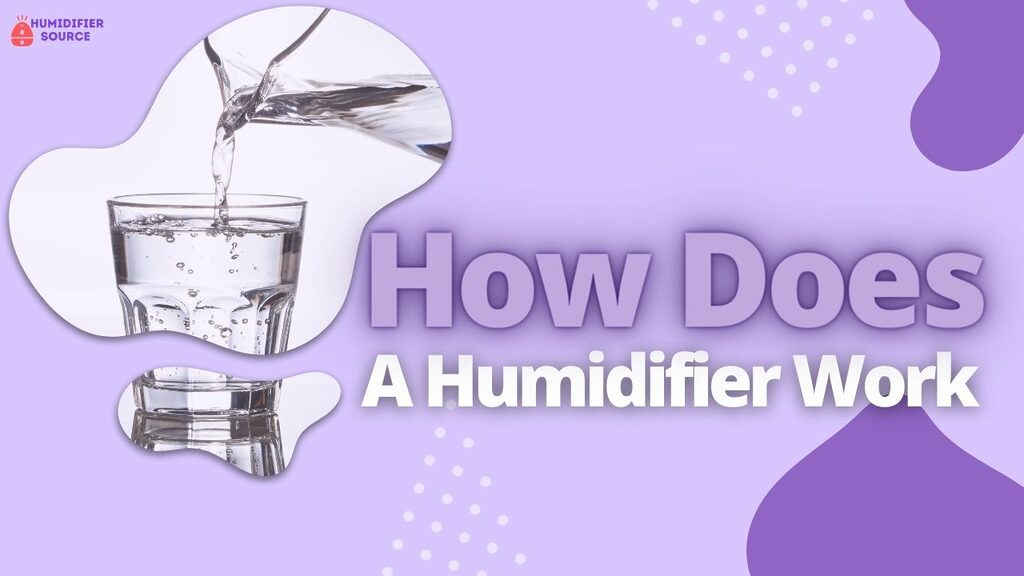
Harmful particles in the air, like dust and pollen, can cause allergies and asthma. Humidifiers assist in trapping these particles and preventing them from entering your nose and throat by increasing the humidity in the air.
When breathing dry air, your nasal passages and sinuses get inflamed. This causes congestion which makes it harder for you to breathe correctly.
You might not realize how much better you feel when there’s more moisture in the air around you until it starts getting too dry again—then, all of a sudden, those symptoms come back.
What Are The Benefits Of Using A Humidifier?
Dry air can cause nosebleeds, headaches, and difficulty breathing. It can also make your skin feel dry and irritated. In extreme cases, it can even lead to cracks in wooden furniture.
A humidifier can help to alleviate these problems by adding moisture to the air. This will keep your skin moisturized and stop headaches and nosebleeds. Additionally, it will protect your furniture from drying out and cracking.
Humidifiers come in two main categories: cool mist and warm mist. Each has its own set of benefits and drawbacks. Cool mist humidifiers are generally more affordable and accessible to maintain than warm mist humidifiers.
However, warm mist humidifiers may provide more relief for specific conditions such as sinus infections or colds/flu.
Are There Any Risks Associated With Using Drinking Water In A Humidifier?
- Bacterial growth. A humidifier’s warm, moist environment is perfect for bacteria to grow and thrive. Suppose you have asthma or another respiratory condition, or your immune system is weakened from illness or medications. In that case, this could cause health problems like sinusitis and pneumonia.
- Mineral build-up. Hard water can leave mineral deposits in the heating element that can erode it over time, which may result in electrical hazards or damage to your humidifier’s motor blades.
- Mould and mildew. A damp space is ideal for mold and mildew growth to occur—and because of how often you use a humidifier, mold and mildew accumulation will likely happen quickly.
Conclusion
Yes, you can use drinking water in a humidifier. However, it is crucial to change the water regularly to prevent the growth of bacteria. It would help if you also cleaned the humidifier regularly to keep it working correctly.
Also, drinking water in a humidifier is excellent and can benefit your health.
Check out other articles on our website or stay up to date with us on social media if you’re interested in learning more about using drinking water in a humidifier or other advice for keeping your humidifier clean and functioning correctly.
Author
- The Right Way To Fill A Humidifier: Hot Or Cold Water?
- Humidifier And AC: Is It A Match Made In Heaven?
- Can I Use A Humidifier With The Window Open (Solve Your Dilemma)
- Perfect Air Quality: How Long To Run Your Humidifier
- Should You Have A Humidifier In Nursery (The Surprising Benefits)
- Humidifiers In Bedrooms: A Guide To Good Placement



